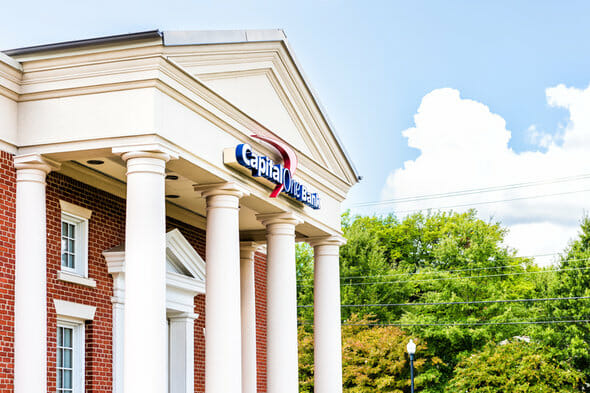When choosing whether to open a bank account with Ally Bank or Capital One, it really comes down to whether you want access to physical branches when you bank. Ally Bank is an entirely online operation, limiting you to its website and mobile app. Capital One also offers those convenient features, but with the added benefit of brick-and-mortar branches throughout the country.
Wondering how to best allocate your savings? Consider speaking with a financial advisor today.
What to Know About Ally Bank
Ally Bank offers some of the best APYs in the industry. For example, the bank’s CDs offer APYs as high as 3.55%, though they can reach as low as 2.90%, depending on the length of the term. Ally’s Online Savings Account also features a solid 3.60% APY, as well as decent rates for the bank’s Interest Checking and Money Market accounts.
Ally does work hard to fill in the gaps where physical locations would otherwise be. It does this with excellent and thorough online and mobile banking features. You can easily access your account(s) with your online banking information. You’ll also have access to more than 55,000 Allpoint® ATMs throughout the U.S.
Of course, if you really value having physical access to your bank, you may not enjoy banking with Ally. This is the bank’s main drawback. For one, opening an account may prove difficult since you may have to mail in proof of identification or address.
What to Know About Capital One
Capital One is excellent for those who want to earn at competitive interest rates and have the advantage of physical branches. The bank doesn’t have branches in every state, with locations only in New York, New Jersey, Texas, Louisiana, Maryland, Virginia, Delaware, Connecticut and the District of Columbia. You can visit the bank’s website to see if there is a branch near you with your address or zip code.
Capital One’s savings account earns at a solid 3.60% APY (as of 4/8/25), and its CDs earn up to 4.00%. Even its MONEY checking account for teens earns a 0.10% APY (as of 4/1/25). These solid rates, paired with the bank’s lack of monthly fees and minimum deposits, make for some appealing options.
Capital One also offers the Capital One Cafe. These are a mix of a Capital One branch and a Peet’s Coffee bar. So while your state or city may not have a typical Capital One branch, you may have access to the same banking services at a Capital One Cafe.
Ally Bank vs. Capital One: Bank Accounts

Both Ally and Capital One offer the same suite of accounts including savings, CDs, checking accounts, money market accounts and IRAs. Each bank has their own strengths, though, when it comes to these accounts.
For one, Ally offers three different types of CDs, each with their own various terms and some of the best CD rates. Ally’s No Penalty CD forgoes the hefty penalty you would typically face for early withdrawal of a CD’s funds. Its Raise Your Rate CD comes with a rate adjustment every two years. Ally’s basic high-yield CD is the same as Capital One’s CD, both offer a range of term lengths with APYs between 3.5-4%.Capital One CDs do allow you to add beneficiaries on your accounts online.
Capital One offers its MONEY Teen checking account, which is tailored for teen account holders. An interest-earning checking account, the MONEY account can help teenagers manage their money together with a parent or guardian. As the adult guardian, you can teach your child how to be responsible with their money. You can also show them how money grows according to the account’s solid interest rate.
Ally Bank vs. Capital One: Fees
Ally Bank and Capital One are both leaders in the industry when it comes to fees. Neither charges monthly fees nor requires a minimum deposit amount for any accounts. This makes each account much more accessible to customers who may otherwise be unable to open such favorable accounts. It also ensures your money will grow unharmed by the bank’s fees.
Of course, there are going to be fees for certain actions you make, but can easily avoid. This includes overdrafts on checking accounts, returned deposit items and outgoing wires. Plus, neither bank will charge you for using an ATM that’s out-of-network. You should avoid using any out-of-network ATMs, however, since both banks provide access to tens of thousands of ATMs nationwide through the Allpoint® and MoneyPass® ATM networks. This means you can use more than 70,000 ATMs. Ally will even reimburse up to $10 of other ATMs’ fees each statement cycle.
Ally Bank vs. Capital One: Rates
On the whole, Capital One’s interest rates are similar to what Ally offers. More specifically, Ally’s savings account offers a 3.60% APY, while Capital One’s features a 3.60% APY (as of 4/8/25). Their multitude of CD rates are also quite similar. Ally’s best CD rate is the 3.9% APY for 6- and 9-month CDs Capital One’s best rate is the 4.00% APY it offers on its 12-month CD.
It’s important to note that both banks’ money market accounts and interest-earning checking accounts earn interest according to balance tiers. This means that your rate depends on your account balance. In these cases, the higher your balance, the higher your rate. Ally’s High-Yield CDs and No Penalty CDs also earn based on balance tiers. Luckily, even the lowest balances earn at competitive rates.
Which Bank Is Better for Specific Needs?
If you prefer managing your money entirely online and want access to high interest rates, Ally Bank may be a better fit. It offers strong APYs across savings, checking, and CD accounts without requiring a minimum deposit. Ally also has a large ATM network and solid digital tools, making it a good option for tech-savvy users who don’t need in-person service.
Capital One may work better if having a physical branch or in-person support is important to you. It offers competitive rates similar to Ally, but also has branches and Capital One Cafes in select locations. This makes it easier to get help in person, which can be helpful for tasks like opening accounts or managing more complex banking needs.
For specific goals, Ally’s No Penalty CDs might appeal to savers who want flexibility, while Capital One’s MONEY Teen checking account is designed for families helping teens learn to manage money. Both banks keep fees low, so the best option depends on whether you value branch access or prefer a fully online experience.
Bottom Line

Ally Bank is an excellent choice for those who want to earn at top rates and don’t mind the lack of physical branches. Capital One, however, still earns at rates well above its big bank competitors’ rates, with the added benefit of some physical locations. You’ll have to find out whether you have a Capital One Cafe or branch near you. Then you can determine which bank would be better for you according to each one’s rates, accounts and other features.
Tips on Finding a Checking Account
- Bank accounts are part of your financial life, so they’re inherently part of your long-term financial plan as well. Finding a financial advisor doesn’t have to be hard. SmartAsset’s free tool matches you with vetted financial advisors who serve your area, and you can have a free introductory call with your advisor matches to decide which one you feel is right for you. If you’re ready to find an advisor who can help you achieve your financial goals, get started now.
- Still not sure which bank is right for you? It’s easy to get caught up in the bells and whistles a bank can offer. Your first step should be to figure out what you want and need from a bank. Do you need a break from fees with a free checking account? Or do you want one with the best overdraft protection? Knowing what you need will help you eliminate options and get you closer to choosing the right bank.
Photo credit: ©iStock.com/Weekend Images Inc., ©iStock.com/ablokhin, ©iStock.com/RyanJLane
